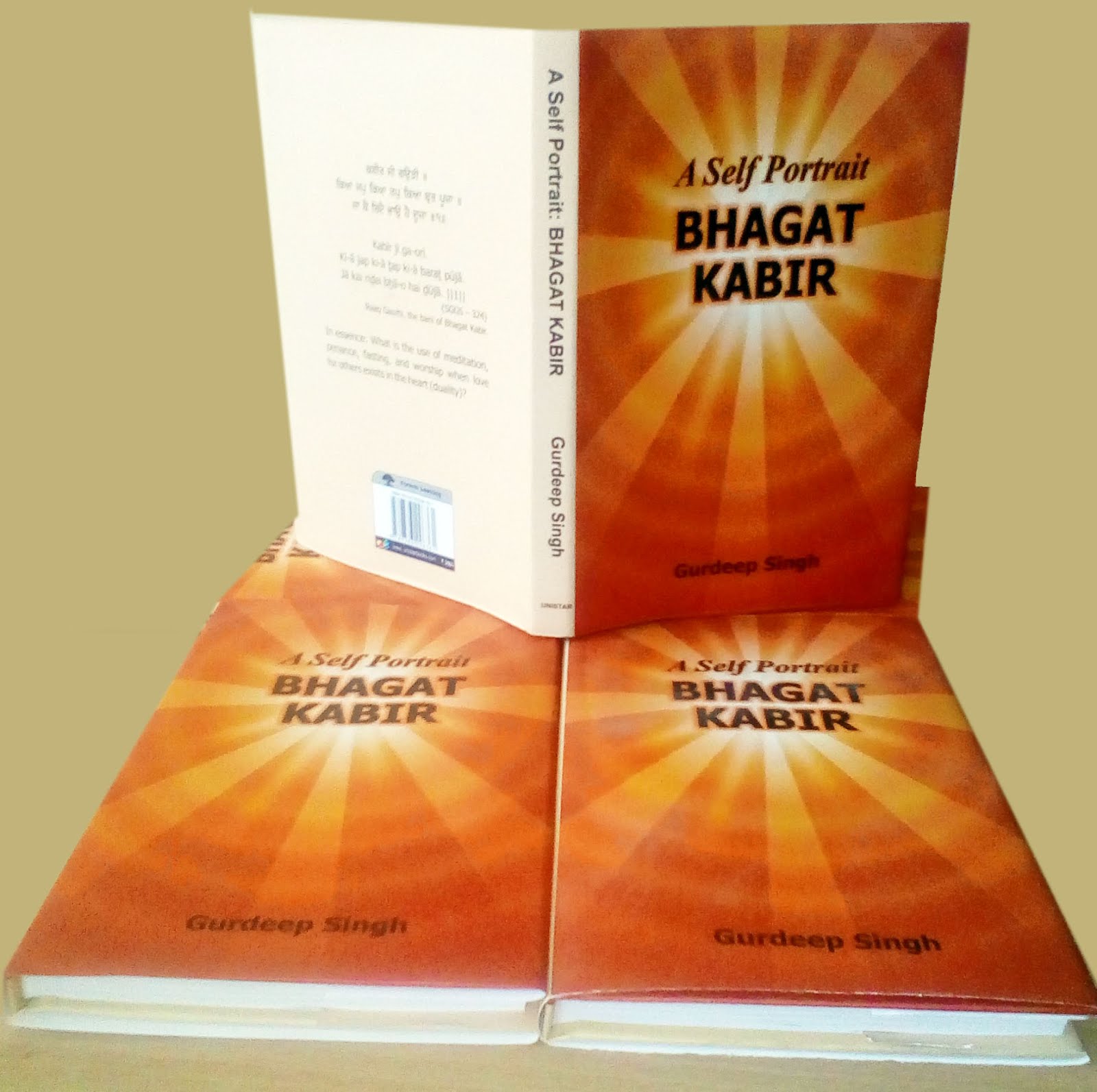ਪਰ ਉਹੀ ਮਨੁੱਖ ਪ੍ਰਭੂ ਜੀ ਦਾ ਨਾਮ-ਅੰਮ੍ਰਿਤ ਹਾਸਲ ਕਰਦਾ ਹੈ ਜਿਸ ਦੀ ਨਿੱਤ ਦੀ ਕ੍ਰਿਆ ਗੁਰੂ ਦਾ ਸ੍ਰੇਸ਼ਟ ਸ਼ਬਦ (ਆਪਣੇ ਅੰਦਰ ਵਸਾਣਾ) ਹੋ ਜਾਏ ॥੧॥ ਰਹਾਉ
20130912
A Reminder About The Forgotten Home
Weakened
by so many attractions and desires, the mind becomes a child forgetting that
the real bliss is not in pursuing its wishes, but in its own realm, which it
has buried within without realizing that nothing is eternal here including the
body it rules. In weakness, it gives in, but in strength, it conquers
everything; however, it hardly gets time to take a dip in the realm it has
buried within. Very rarely, an enlightened soul comes by and gives it a call to
wake up from its slumber of outer attractions and desires. The enlightened soul
advises it to go deep within by abandoning every desire and attachment; if it
comprehends the enlightened one’s advice, it sinks deep into the buried realm
within abandoning all outer veils it loves to wear. Then, it sees another
glowing light in the realm and gets absorbed in it. That glowing light
reanimates it into a wonderful phenomenon. After that, though the body works
fully, but within occurs a revolutionary birth of the mind. When it peeps out,
there is left nothing to attract it or to worry or to fear or to think about.
As the fish swims in a pond of water and sees nothing but the water, it sees
the same glowing light everywhere. Its body remains a simple vehicle to carry
it around. The world that was once its guide stands still leaving no effect on
it (the mind). In the spiritual realms, it is called enlightenment or vision of
the Creator. The following shabda over flows with First Nanak’s advice through
which he awakens his follower’s mind from slumber of desires by making it aware
of the certainty of the end of the beginning. The Guru reminds his follower’s
mind to look around and see how the truth of the eminent death remains shining
all the time. Let us go through that shabda on 23, SGGS and realize if we are
also missing what the Guru is pointing out:
ਸਿਰੀਰਾਗੁ ਮਹਲਾ ੧ ਘਰੁ ੨ ॥
ਧਨੁ ਜੋਬਨੁ ਅਰੁ ਫੁਲੜਾ ਨਾਠੀਅੜੇ ਦਿਨ ਚਾਰਿ ॥
ਪਬਣਿ ਕੇਰੇ ਪਤ ਜਿਉ ਢਲਿ ਢੁਲਿ ਜੁੰਮਣਹਾਰ ॥੧॥
Sireeraag mehlaa 1 ghar 2.
Dhan joban ar fulrhaa naathee-arhay din chaar.
Paban kayray pat ji-o dhal dhul jummanhaar. ||1||
Raag Sree Raag, the bani of First Nanak: house second:
In essence: Wealth, youth and a beautiful flower are the guests of a short time; they perish like the perishable leaves of Lily, which wither and die at a bank of a river in a short time.
We can live over 80 to 100 years or so, but the life span is not guaranteed; it doesn’t matter if it is longer in years, but its span is limited to certain numbers. The Guru gives an analogy of a lily flower that doesn’t last long. The idea is to remember our eminent end, which is due. Through this, attaching to materialistic goals is questioned. The Guru is reminding about our relation we have with our Creator, and he asks us why it is forgotten in the materialistic pursuits? Living in everlasting bliss, in which our minds become free like the birds in the sky, is more important than all the materialistic achievements that fail to give us ever-lasting joy. To obtain such bliss, it is mandatory to be one with our Creator. To enjoy our relation with our Creator shouldn’t be ignored. The time we have at hand should be used to rekindle our relation with our Creator:
ਰੰਗੁ ਮਾਣਿ ਲੈ ਪਿਆਰਿਆ ਜਾ ਜੋਬਨੁ ਨਉ ਹੁਲਾ ॥
ਦਿਨ ਥੋੜੜੇ ਥਕੇ ਭਇਆ ਪੁਰਾਣਾ ਚੋਲਾ ॥੧॥ ਰਹਾਉ ॥
Rang
maan lai pi-aari-aa jaa joban na-o hulaa.
Din
thorh-rhay thakay bha-i-aa puraanaa cholaa. ||1||
rahaa-o.
Oh dear! Enjoy the love of Akalpurakh
now when you are in good health; the body will grow old as only a few days ( a
short time) are left. Pause.
In the above verses, youth is not used for the period of youthfulness,
but for a time when the praise of Akalpurakh
should be done. The entire life is to enjoy Akalpurakh’s
love; nothing should become hindrance in praising Naam. The things that keep attracting the mind are temporary, but
the sweet love of the Creator is evergreen. Think about those ones, who were
dear to us. Where have they gone? What
about us?
ਸਜਣ ਮੇਰੇ ਰੰਗੁਲੇ ਜਾਇ ਸੁਤੇ ਜੀਰਾਣਿ ॥
ਹੰ ਭੀ ਵੰਞਾ ਡੁਮਣੀ ਰੋਵਾ ਝੀਣੀ ਬਾਣਿ ॥੨॥
Sajan
mayray rangulay jaa-ay sutay jaaraan.
Han
bhee vanjaa dumnee rovaa jheenee baan.
||2||
My beloved friends have rested in the graveyard; I too, though double
minded, weep feebly (thinking I shall also depart).
We know that if our dear ones have gone, we will also go, but we remain
in a denial. The Guru is just reminding
us that our dear ones depart from us forever and our turn remains due;
therefore, we should realize about this passing span of life. It shouldn’t be
wasted by not remembering Ekankaar.
As we witness our close one’s death, it affects us temporarily and as the time
passes, we get back into our same business we were in. In the next verses, the
Guru reminds us the truth we hear everyday about our final departure from here,
and he tells us that we don’t take it seriously.
ਕੀ ਨ ਸੁਣੇਹੀ ਗੋਰੀਏ ਆਪਣ ਕੰਨੀ ਸੋਇ ॥
ਲਗੀ ਆਵਹਿ ਸਾਹੁਰੈ ਨਿਤ ਨ ਪੇਈਆ ਹੋਇ ॥੩॥
Kee
na sunayhee goree-ay aapan kannee so-ay.
Lagee
aavahi saahurai nit na pay-ee-aa ho-ay. ||3||
Oh beautiful one! Haven’t you heard this news with your own ears? (What
is the news? Its answer follows) One cannot live in this world forever, because
one has to depart from here.
Is it a new thing that we don’t
understand it, or is it our denial that makes us ignore our due departure? The
Guru asks us a question: haven’t we heard that we are bound to go eventually?
The Guru takes this world as a
parental home and takes “in - laws home” as going to Akalpurakh to settle down forever (as a daughter leaves her
parental home and settles in - law's home), because Akalpurakh is the Spouse of all the soul-brides as it is stated on 933, SGGS:
ਠਾਕੁਰੁ ਏਕੁ ਸਬਾਈ ਨਾਰਿ ॥
Thaakur
ayk sabaa-ee naar.
There is only
one Husband (Ekankaar) and all the
rest are His brides.
The shabda
continues:
ਨਾਨਕ ਸੁਤੀ ਪੇਈਐ ਜਾਣੁ ਵਿਰਤੀ ਸੰਨਿ ॥
ਗੁਣਾ ਗਵਾਈ ਗੰਠੜੀ ਅਵਗਣ ਚਲੀ ਬੰਨਿ ॥੪॥੨੪॥
Naanak
sutee pay-ee-ai jaan virtee sann.
Gunaa
gavaa-ee ganth-rhee avgan chalee bann. ||4||24||
Oh Nanak! The soul-bride
remains in slumber (of Maya) and she
is being robbed during the broad daylight. This way, she has lost all virtues
and she will depart from here with the load of bad deeds.
In the Maya slumber, the soul bride fails to realize that she is losing
her virtues in pursuits of the Maya attractions. Without any virtue, she cannot
comprehend that the things she is in love with are actually her adversaries,
because they cripple her spiritually in a big way. The time at hand is spent in
the Maya attractions, but loving the Creator has been put off or
forgotten. The Guru comes by to awaken
her so that she can enlighten her mind and make it a conqueror over the outer
influences by dipping deep down in the buried realm where always a glowing
light glitters though unseen. A Guru follower, who pays heed to the Guru’s
advice, sees his or her skin of hypocrisy and sheds it by eliminating
inclinations toward the outer Maya attractions. By doing so, he or he becomes
determined to see the glowing light within. On 1255, SGGS, the Guru elaborates
how to see that glittering light of the Creator; he says:
Mėhlā 1 malār. Par ḏārā par ḏẖan par lobẖā ha▫umai bikẖai bikār. Ḏusat bẖā▫o ṯaj ninḏ parā▫ī kām kroḏẖ cẖandār. ||1|| Mahal mėh baiṯẖe agam apār. Bẖīṯar amriṯ so▫ī jan pāvai jis gur kā sabaḏ raṯan ācẖār. ||1|| rahā▫o.
In essence: Give up
interest in other’s woman, wealth, your excessive greed, self – conceit,
poisonous vice, ill inclination, slandering of others, lust, and anger; the
infinite Creator is sitting within your body mansion; however, only that
person, who makes the precious teachings of the Guru a base to live, realizes
the nectarous presence of the Creator. Pause
(ਜੇਹੜਾ ਮਨੁੱਖ ਗੁਰੂ ਦਾ ਸ਼ਬਦ ਹਿਰਦੇ ਵਿਚ ਵਸਾਂਦਾ ਹੈ ਤੇ ਆਤਮਕ ਜੀਵਨ ਦੇਣ ਵਾਲਾ ਨਾਮ-ਰਸ ਹਾਸਲ ਕਰਦਾ ਹੈ, ਉਹ) ਪਰਾਈ ਇਸਤ੍ਰੀ (ਦਾ ਸੰਗ), ਪਰਾਇਆ ਧਨ, ਬਹੁਤ ਲਾਲਚ, ਹਉਮੈ, ਵਿਸ਼ਿਆਂ (ਵਾਲੀ ਰੁਚੀ), ਮੰਦੇ ਕਰਮ, ਭੈੜੀ ਨੀਅਤ, ਪਰਾਈ ਨਿੰਦਿਆ, ਕਾਮ ਅਤੇ ਚੰਡਾਲ ਕ੍ਰੋਧ-ਇਹ ਸਭ ਕੁਝ ਤਿਆਗ ਦੇਂਦਾ ਹੈ ॥੧॥
As stated on 503, SGGS, the
Guru advises his follower to get rid of his those distracting inclinations,
which stop his mind to envision the glittering and glowing light of the Creator
within. He makes it clear that a person, who follows the Guru and lives exactly
according to the Guru’s advice by abandoning his own thinking influenced by
others, sees the infinite Creator within.
ਆਚਾਰ
is used for living in Akalpurakh’s
praise. If we want to envision the Creator within, we must change, and that
change must take us out of our all attachments. Loving our family is not
attaching to it, but selling our virtues for it is indeed the influence of our
attachment. There is only one choice for a person, who desires to envision the
glittering and glowing light within, and that is to become detached while
living right in the Maya engrossed world
ਅਪਹੁੰਚ ਤੇ ਬੇਅੰਤ ਪ੍ਰਭੂ ਜੀ ਹਰੇਕ ਸਰੀਰ ਵਿਚ ਬੈਠੇ ਹੋਏ ਹਨ (ਮੌਜੂਦ ਹਨ),
ਪਰ ਉਹੀ ਮਨੁੱਖ ਪ੍ਰਭੂ ਜੀ ਦਾ ਨਾਮ-ਅੰਮ੍ਰਿਤ ਹਾਸਲ ਕਰਦਾ ਹੈ ਜਿਸ ਦੀ ਨਿੱਤ ਦੀ ਕ੍ਰਿਆ ਗੁਰੂ ਦਾ ਸ੍ਰੇਸ਼ਟ ਸ਼ਬਦ (ਆਪਣੇ ਅੰਦਰ ਵਸਾਣਾ) ਹੋ ਜਾਏ ॥੧॥ ਰਹਾਉ
ਪਰ ਉਹੀ ਮਨੁੱਖ ਪ੍ਰਭੂ ਜੀ ਦਾ ਨਾਮ-ਅੰਮ੍ਰਿਤ ਹਾਸਲ ਕਰਦਾ ਹੈ ਜਿਸ ਦੀ ਨਿੱਤ ਦੀ ਕ੍ਰਿਆ ਗੁਰੂ ਦਾ ਸ੍ਰੇਸ਼ਟ ਸ਼ਬਦ (ਆਪਣੇ ਅੰਦਰ ਵਸਾਣਾ) ਹੋ ਜਾਏ ॥੧॥ ਰਹਾਉ
All ill inclinations stated
above become a cause of a spiritual death; these inclinations are an out come
of the pressure of the five negative forces that keep robbing the mortal off
his virtues. The Guru wants his follower to get rid of it; please see an
elaboration of this idea on 503, SGGS:
ਏਕ ਨਗਰੀ ਪੰਚ ਚੋਰ ਬਸੀਅਲੇ ਬਰਜਤ ਚੋਰੀ ਧਾਵੈ ॥
ਤ੍ਰਿਹਦਸ ਮਾਲ ਰਖੈ ਜੋ ਨਾਨਕ ਮੋਖ ਮੁਕਤਿ ਸੋ ਪਾਵੈ ॥੧॥
Ayk nagree panch chor basee-alay barjat choree Dhaavai.
Tarihdas
maal rakhai jo naanak mokh mukat so paavai. ||1||
In essence: In this body - town live
the five thieves (the five negative forces). Even if it is tried to stop them, still they go out to
steal. Oh Nanak! That person, who
keeps the virtuous Naam - capital
intact from the three modes of Maya
and instincts of ten organs, obtains liberation.
Once the mind is convinced
to live only according to the Guru’s advice, it becomes able to experience the
glowing and glittering light of the Creator, and about that the Guru says:
The infinite Creator is
sitting within your body mansion.
Once one realizes the
glittering light (addressed by many names), one acquires the ultimate wisdom to
understand how to coexist with all kinds of lives without letting one’s self
conceit interfere in the Ordinance of the Creator, because one becomes one with
the source by aligning with the entire creation. Once the infinite Creator (ਅਗਮ ਅਪਾਰ ) is envisioned, the duality and the Maya
attractions become insignificant; otherwise, the illusionary game continues and a call of the Guru goes
unheard.
Partial interpretation in
Punjabi is done by Dr Sahib Singh.
Humbly
G Singh
Labels:
GURMAT VICHAR
Subscribe to:
Posts (Atom)









